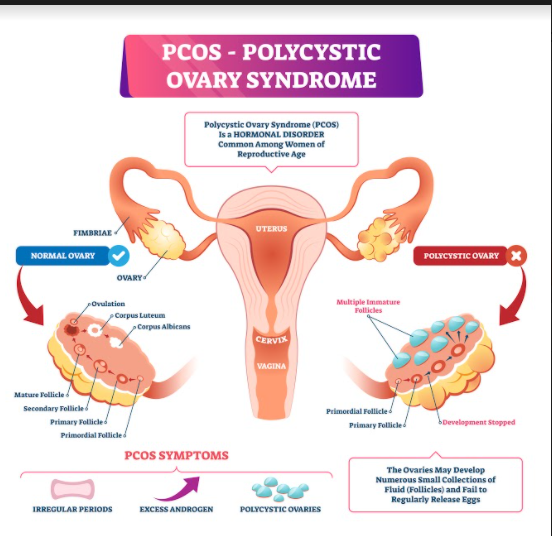There may come a time in your life when you’ll decide to start a family. Once you’ve decided that you’re ready for a new chapter of your life, you may begin to try to get pregnant actively. If you’re healthy and your reproductive system is in good shape, you may find it easy to conceive.
It is imperative that when you decide you are ready to start a family, you schedule an appointment with your doctor. They will help you with your next steps of conceiving naturally, or if you should explore options such as home insemination, IVF, or IUI.
However, if you’re experiencing any of these health complications, you may find it more challenging to get pregnant:
Polycystic Ovarian Syndrome (PCOS)
Your hormones have a significant influence on your reproductive health and may affect your chances of getting pregnant. If you’re experiencing a hormonal imbalance in your body, you may not be able to produce healthy egg cells fit for fertilization.
Polycystic Ovarian Syndrome (PCOS) is a type of hormonal disorder occurring in females. Some start to develop this problem during the first few years of puberty, while others experience it later in life due to various factors, like considerable weight gain. If you have this condition, you may find it difficult to get pregnant.
PCOS can influence your menstrual cycles and cause them to happen less frequently. This condition may also result in longer periods than what you usually experience. For instance, your cycle may have an interval of more than 35 days and be heavier than average if your reproductive system isn’t in good condition.
In addition, PCOS will cause enlarged ovaries with follicles that aren’t functioning efficiently. If this happens, you may encounter difficulties conceiving naturally. So, if you’re trying to have a baby and show symptoms of this condition, you may require medical attention. You can visit an expert within your area so you can determine how you can battle your illness. For instance, if you’re from Australia, you can look for the best gynecologist in Melbourne for PCOS to receive assistance.
Premature Ovarian Failure (POF) 
Most women will start to experience symptoms of menopause around their forties or fifties. This condition will cause less frequent periods until the body stops producing reproductive hormones. Once a female’s menstrual cycle stops, they won’t be able to bear children. Although menopause is a biological process for all women, experiencing it too early may indicate problems in your health.
Premature ovarian failure (POF) has similar symptoms to menopause and may occur during your early twenties to thirties. If you develop this complication, you may experience hot flashes, irregular periods, and vaginal dryness. In addition, your reproductive system may also stop functioning properly, which may lead to fertility issues. When this occurs, you may find it harder to get fertilized or keep your baby in case you’re already pregnant.
Fortunately, there are ways to combat this health condition. For one, you can visit a fertility clinic to get tested and receive treatments, like hormonal therapies, to improve your chances of conceiving a child.
Although it may not guarantee a full recovery, it may keep your health concern at bay and help you manage POF better.
Endometriosis
If you wish to get pregnant, another health complication you should watch out for is endometriosis. If you develop this condition, the layer of tissue lining in your uterus may grow outside your womb, causing you pain and heavy periods. Your ovaries and fallopian tubes may also be affected, making it difficult for you to become fertile.
If you happen to conceive a baby while enduring this condition, you may need to be more careful since endometriosis can increase your chances of miscarriage.
Women who experience this reproductive problem can seek treatment or operation to increase their chances of getting fertilized. Surgery will remove the endometriotic cysts present in the uterus, helping improve pregnancy rates.
Weight Problems
Obesity or being underweight can both contribute to your fertility. If your body mass index (BMI) falls below the recommended range, you may experience disruption in your typical cyclic hormonal patterns and find it more challenging to get pregnant.
Being overweight may also affect your chances of conceiving a baby since your estrogen and androgen levels may be too high for a healthy ovulation cycle. If you get pregnant while dealing with weight problems, you may also have a more challenging and sensitive pregnancy. Hence, if you want to start your own family and keep your baby healthy, it’s vital to keep your body in optimal shape.
You can start improving your body’s condition by eating healthy and exercising. If you need to shed some extra pounds, you can try going to the gym. It’ll also help if you monitor what you eat and prioritize consuming nutrient-rich foods.
Additionally, it would be helpful to ask an expert’s advice on your health to ensure you’re doing the proper regimen to increase your pregnancy chances.
Stress
If you don’t have any serious health complications affecting your fertility, you may need to re-evaluate other aspects of your life to see what contributes to your chances of getting pregnant. For example, stress may play a role in your chances of conceiving. It may also have a long-term effect on how well your pregnancy journey will go. If you’re undergoing too much stress, your emotions may make it challenging to maintain a healthy lifestyle and conceive a baby.
In addition, being stressed out may also get in the way of your attempts to get pregnant. For instance, you may feel less hopeful about a successful IVF if you’re feeling down or don’t have the resolve to keep trying. This feeling of anxiety will, in turn, play a role in how your body responds to the treatments you’re getting.
Hence, if you want to have a baby, it may be best to keep your stress levels under control or avoid external factors causing you to get stressed out. You may also try practicing relaxation methods to help your mind and body calm down and release any built-up stress.
Final Thoughts
Some health conditions, like polycystic ovarian syndrome or endometriosis, may affect your fertility. Fortunately, some health complications related to infertility are manageable with the help of medical experts, fertility treatments, and medications. So, if you’re planning on having a baby while managing your health, it’s best to seek professional advice. Doing so will ensure you won’t put yourself at risk trying to conceive and preserve your child’s health once you successfully get pregnant.